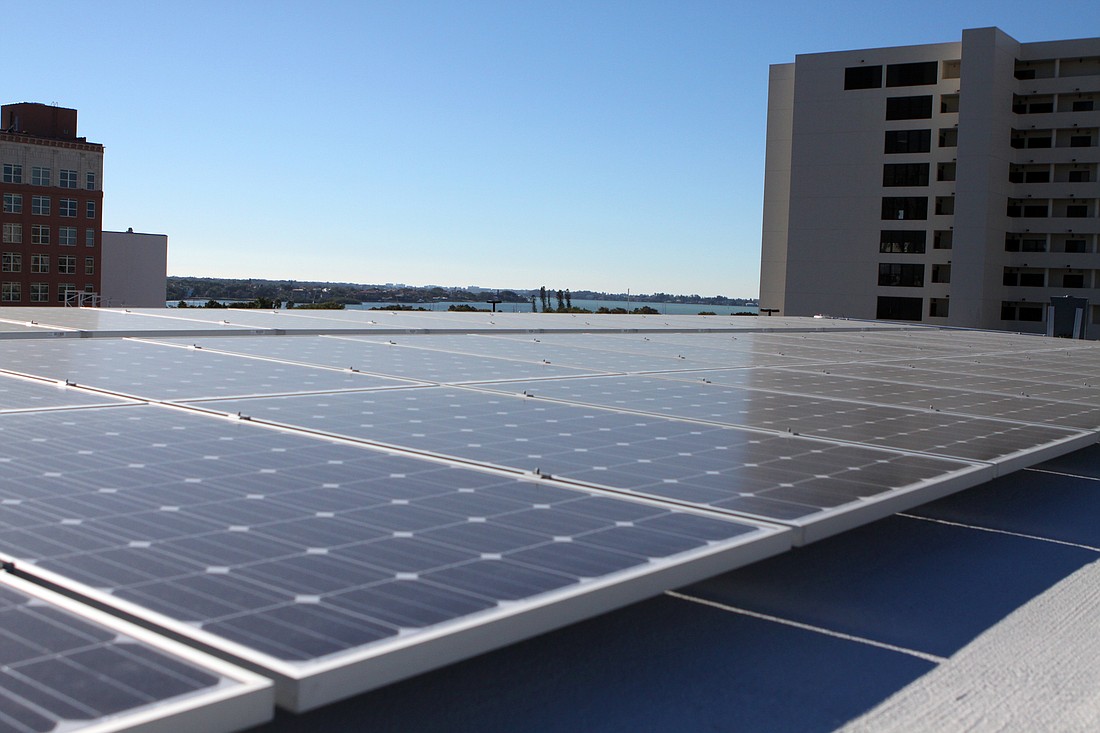- April 25, 2024
-
-
Loading

Loading

On average, Sarasota sees about 2,930 hours of sunlight a year, and one grassroots organization is hoping to use that power for more than tanning at the beach.
Solar United Neighbors, a nonprofit focused on bringing rooftop solar power to counties across 12 states, is starting its third co-op in Sarasota.
The co-op is open to anyone with a home in Sarasota County. It allows homeowners to negotiate in a group with solar panel installers for a lower price.
Solar United Neighbors previously started co-ops in Sarasota County in 2016 and 2018 with a total of 100 households. The households participating in those co-ops have created 14 jobs, invested a total of $1.98 million into the local economy and created a total lifetime carbon pollution offset of 31.1 million pounds, organizers say.
The homeowners will collectively save $3.4 million on electricity in their lifetimes.
Julia Herbst, Gulf Coast Program Coordinator for Solar United Neighbors, said a co-op is a great option.
“They’ll get a custom proposal from the installer and based on the co-op pricing, they can sit down with their family and decide, is this going to fit our budget, how are we going to finance it,” Herbst said. “Then they can make a decision whether they want to sign a contract or not.”
According to the Center for Sustainable Energy, the average cost for solar panels is between $15,000 and $25,000, depending on a home’s energy needs.
“It’s a big expense, but we like to think of it as an investment,” Herbst said. “This isn’t something that’s going to lose value. These systems last at least 25 years. It is a big expense, but it’s a solid investment.”
A Department of Energy report found that since 2014, the average cost of solar panels has dropped nearly 50%. The latest National Renewable Energy Laboratory quarterly solar update found that eight states generate more than 5% of their electricity from solar, with California leading at 19%.
Herbst said there are many benefits to solar panels, including federal solar tax credits. Because most of the installations of the 2020 co-op will be done in 2021, the federal tax credit is 22%.
However, in 2022, the tax credit goes away.
The co-ops in Sarasota were made possible by the Gulf Coast Community Foundation, which gave funds to Solar United to get programs started.
The co-op is a step toward 100% renewable energy for the county, which many local organizations have been lobbying for. The Sierra Club hopes to get the county to sign the Ready for 100 pledge, which asks the county to commit to full use of renewable energy countywide by 2045.
The city of Sarasota signed the pledge in 2017, which means it aims to run city buildings and operations on renewable energy by 2030 and all operations city-wide by 2045.
This year’s co-op, which already has 38 members, has selected Region Solar to install its panels.
“Region Solar is humbled and deeply appreciate that we were selected as the installer for the Sarasota County Solar Co-op,” said Chief Financial Officer Lydia Patton. “We’re excited for the opportunity to continue to empower the Sarasota community.”
The company will provide each co-op member with an individualized price proposal based on the needs of their home and the co-op’s group price.
The group is open to new members until Dec. 18.
“It’s the end of the year and you start to think, ‘What do I have control over?’” Herbst said. “This is a way that you can control your bills, take action and start the new year off right with a really positive energy feature.”
Those interested can sign up on Solar United's website. Joining the co-op is free and is not a commitment to purchasing the panels.